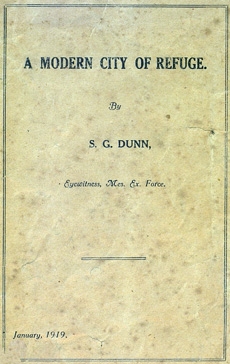
A modern city of refuge
One of the most interesting sights in the occupied territory of 'Iraq at the present time is the enormous camp at Ba'qubah, thirty-three miles north-east of Baghdad, in which are living some forty-five thousand people who fled for protection to our Army in the late summer of last year when they had been forced out of their own country by the overwhelming pressure of Turk, Persian and Kurd. The sudden influx of so large a number of starving and destitute refugees, most of them enfeebled by diseases as a consequence of long exposure to the cruel conditions of a hurried flight through hostile regions, would put a severe strain upon the most efficiently organised modern state with all the resources of civilisation at its command ; but at Hamadan where this vast undisciplined horde first came in contact with our line of communications through Persia, there was only a small post of British troops precariously supplied at the best of times by motor transport along the two hundred miles of very rough road from Baghdad. The locality itself had been stripped bare by the Turkish and Russian Armies which had successively occupied it, and its inhabitants were in a deplorable condition only relieved by the measures which we had taken on our recent arrival to keep them from utter starvation. The problem created by the appearance of these new claimants to our charity can be imagined, and in the whole history of our campaign here there can be no more amazing chapter than that which tells how we tackled it. The success of our endeavours is patent to anyone who visits the camp where these refugees are now enjoying a better condition of life than they have known for many years past and visibly recovering every day from the effects of their terrible experience; but, before attempting to describe what I saw there, it may be of interest to give some account of the people themselves and the events which led to their passing, under our care.
.....
A modern city of refuge
by
S. G. Dunn,
Eyewitness, mes. ex. force.
January, 1919.